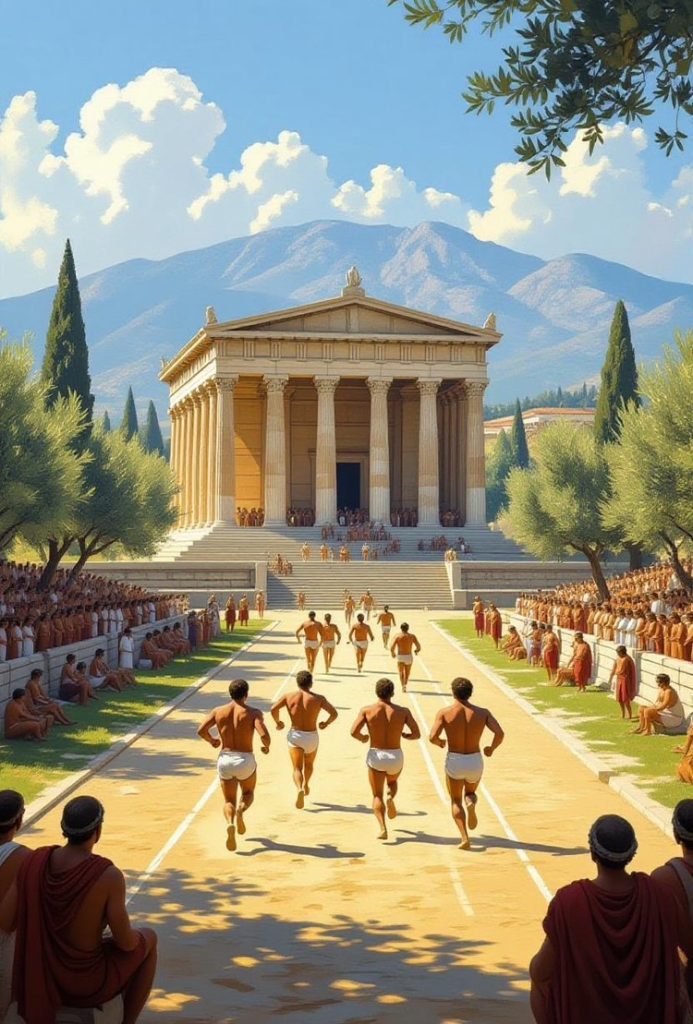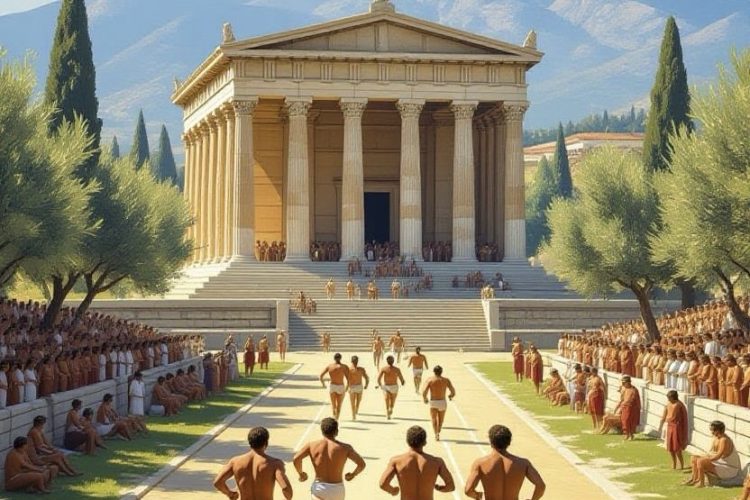The ancient Olympic Games, first held in 776 BC at Olympia, were a major cultural and religious festival in Ancient Greece, honoring Zeus. Freeborn Greek men from across city-states competed in events like running, wrestling, boxing, pankration, the pentathlon, and later equestrian races, often training for months in strict seclusion. The games promoted unity through the Olympic truce, while winners earned olive wreaths and lasting fame. Women were largely excluded, though some, like Spartan chariot owners, could gain recognition. The festival included poetry and artistic contests, blending sport, culture, and religion. The games thrived for over a millennium before being banned in 393 AD, but their legacy inspired the modern Olympics in 1896.
Long Version
The Ancient Olympic Games: A Timeless Legacy of Athletic Excellence and Cultural Unity
The ancient Olympics, formally known as the Olympic Games, stand as one of the most enduring symbols of Ancient Greece’s cultural highlight. Originating in 776 BC at the sanctuary of Zeus in Olympia, these Panhellenic Games brought together freeborn Greek men from across city-states, fostering unity amid frequent war times. The mythological origin traces back to Heracles, who, according to legend, founded the games after completing his labors, measuring the stadion (stadium) in Hercules feet—approximately 192 meters—for the footrace. This inaugural event saw Koroibos of Elis emerge victorious in the stadion race, marking the start of the Olympiad, a four-year cycle that became a cornerstone of historical chronologies in the Greek world.
Control of the games initially shifted between the Pisatans and the people of Elis, but by the 6th century BC, Elis solidified its oversight, transforming Olympia into a bustling hub of athletic contests and religious festival. Nestled near Mount Olympus—the mythical abode of the Greek gods—the site overlooked the Mediterranean Sea, drawing spectators, artists, and poets from Greek colonies as far as Italy and beyond, thus aiding the Greek culture spread. The games were not mere sporting events; they embodied political expressions, where city-states forged alliances and conducted political deals under the protection of the Olympic truce (ekecheiria), a sacred ceasefire that ensured safe passage for all participants, even during conflicts.
At the heart of Olympia lay the Sanctuary of Zeus, featuring the majestic Temple of Zeus, home to a colossal statue of the god crafted from ivory and gold by Phidias—a masterpiece counted among the Seven Wonders of the Ancient World. This chryselephantine figure, seated on a throne, overlooked the Altar of Zeus, where priests conducted sacrifices and victory prayers, underscoring the games’ profound religious significance. Held every four years in honor of Zeus, the father of the Olympian gods, the competitions blended piety with prowess, as athletes sought divine favor through their feats. The Panhellenic nature extended to other festivals like the Pythian Games at Delphi, dedicated to Apollo; the Nemean Games at Nemea, honoring Zeus; and the Isthmian Games at Corinth, celebrating Poseidon—collectively forming the circuit where victors could achieve periodonikes status by triumphing in all.
Participation was strictly limited to freeborn Greek men; slaves were banned, and women were mostly excluded from attending or competing, with severe penalties for violations. However, exceptions existed: victorious women chariot owners, such as Cynisca of Sparta, could claim glory through their teams in equestrian events, as ownership sufficed for victory. Women had their own parallel event, the Heraia, held in honor of Hera at Olympia. Organized by sixteen married women from Elis, it featured footraces for maidens in age groups, with winners receiving olive wreaths and portions of a sacrificed cow—mirroring the men’s structure but emphasizing feminine rites like weaving a peplos for Hera’s statue.
Athletes competed nude, a practice symbolizing equality, purity, and the display of physical strength to honor Zeus, while also preventing cheating through concealed aids. Preparation was rigorous: competitors underwent ten months of training in seclusion at Elis, adhering to sexual abstinence and vegetarian fasting to purify body and spirit. Boys’ competitions were introduced in 632 BC, starting with wrestling and expanding to include the stadion race, allowing younger athletes to showcase their potential.
The events evolved over centuries, beginning with the simple stadion race in 776 BC and growing to encompass a five-day program by the 5th century BC. Core athletic contests included:
- Running Events: The stadion (one length of the stadium), diaulos (two lengths), and dolichos (long-distance, up to 24 lengths), testing speed and endurance.
- Combat Sports: Wrestling, where holds and throws aimed for three falls; boxing, using leather thongs with no rounds until submission; and pankration, a brutal no-holds-barred mix of wrestling and boxing, allowing nearly everything except biting and gouging.
- Pentathlon: A versatile test combining discus throwing, javelin throwing, long jump (with weights for momentum), a footrace, and wrestling, crowning the most well-rounded athlete.
- Equestrian Events: Added in 680 BC, these featured chariot racing (tethrippon for four horses) and horse racing (keles), often the domain of wealthy owners, with dramatic crashes and high stakes.
Beyond athletics, the games included poetry competitions and writing competitions, where artists and poets vied for recognition, enriching the cultural tapestry. Victors received symbolic prizes: an olive wreath at Olympia, a celery wreath at Nemea, a pine wreath at Isthmia, and sometimes a bronze shield or amphora of olive oil—tokens of eternal fame rather than material wealth.
Ancient scholars like Hippias of Elis, who compiled victor lists around 400 BC; Ephorus, Eratosthenes, Timaeus, and Strabo, who documented timelines; and Aristotle, who pondered the games’ philosophical underpinnings, provide much of our knowledge. Modern historian Paul Christesen has further illuminated these sources, offering insights into the games’ societal role.
The ancient Olympics thrived for over a millennium, peaking under Roman rule but declining amid shifting empires. In 393 AD, Emperor Theodosius I, seeking to eradicate pagan festivals, issued edicts banning sacrifices and rituals, effectively ending the games—though some athletic traditions lingered briefly. This closure marked the end of an era, but the spirit of competition and unity revived in 1896, echoing the ancient ideals that once united the Greek world.

Hashtags For Social Media
#AncientOlympics #OlympicHistory #GreekHistory #AncientGreece #OlympiaGreece #OlympicGames #HistoryLovers #AncientSports #GreekCulture #HistoricalFacts #OlympicLegends #AncientAthletes #MythologyAndHistory #OlympicTradition #HistoryDaily #AncientCivilizations #ClassicHistory #HistoricalTravel #GreekMythology #OlympicEvents #HistoryGram #LearnHistory #HistoryVibes #CulturalHeritage #HistoryNerd #HistoryFactsDaily #AncientWorld #OlympicLegacy #HistoryExplained #ExploreHistory
Related Questions, Words, Phrases
what were the ancient olympic games | history of the ancient olympics | who competed in the ancient olympics | when did the first olympic games take place | ancient olympic games events list | significance of the olympic games in greece | why were the olympic games held in olympia | famous athletes of the ancient olympics | rules of the ancient olympic games | how often were the ancient olympics held | origin of the olympic games | religious role of the ancient olympics | ancient olympics vs modern olympics | olympic truce in ancient greece | women in the ancient olympics | training for ancient olympic athletes | ancient olympics stadion race | pankration in ancient olympics | pentathlon events in ancient greece | chariot racing in the ancient olympics | winners of the first olympic games | ancient olympics prizes and awards | temples and sanctuaries at olympia | how long did the ancient olympics last | role of art and poetry in ancient olympics | decline of the ancient olympics | ancient olympics under roman rule | why did the ancient olympics end | heraia games for women | olympia archaeological site facts | ancient olympics cultural impact | myths associated with the olympic games | notable victories in ancient olympics






